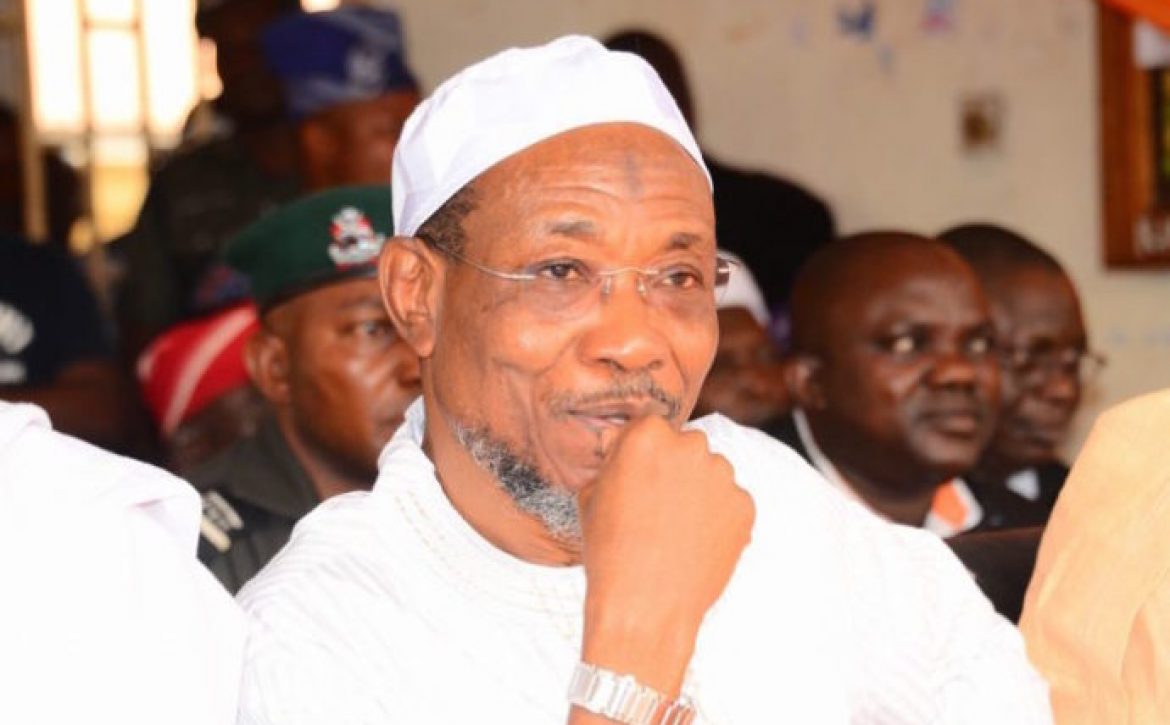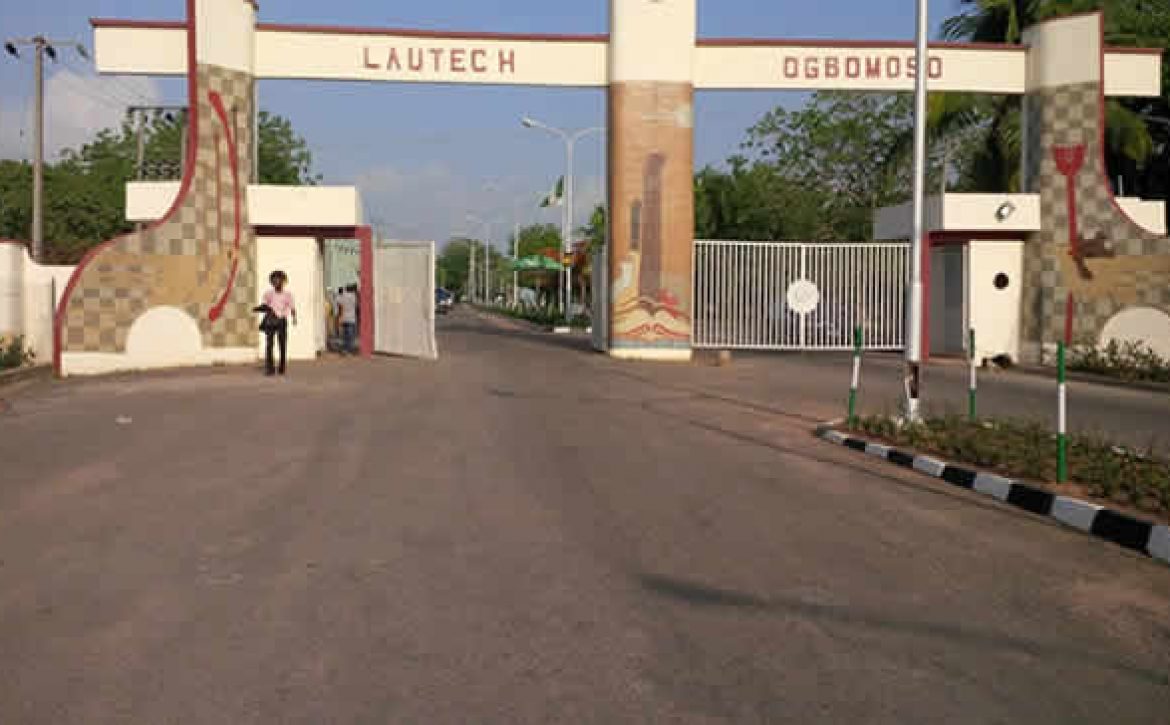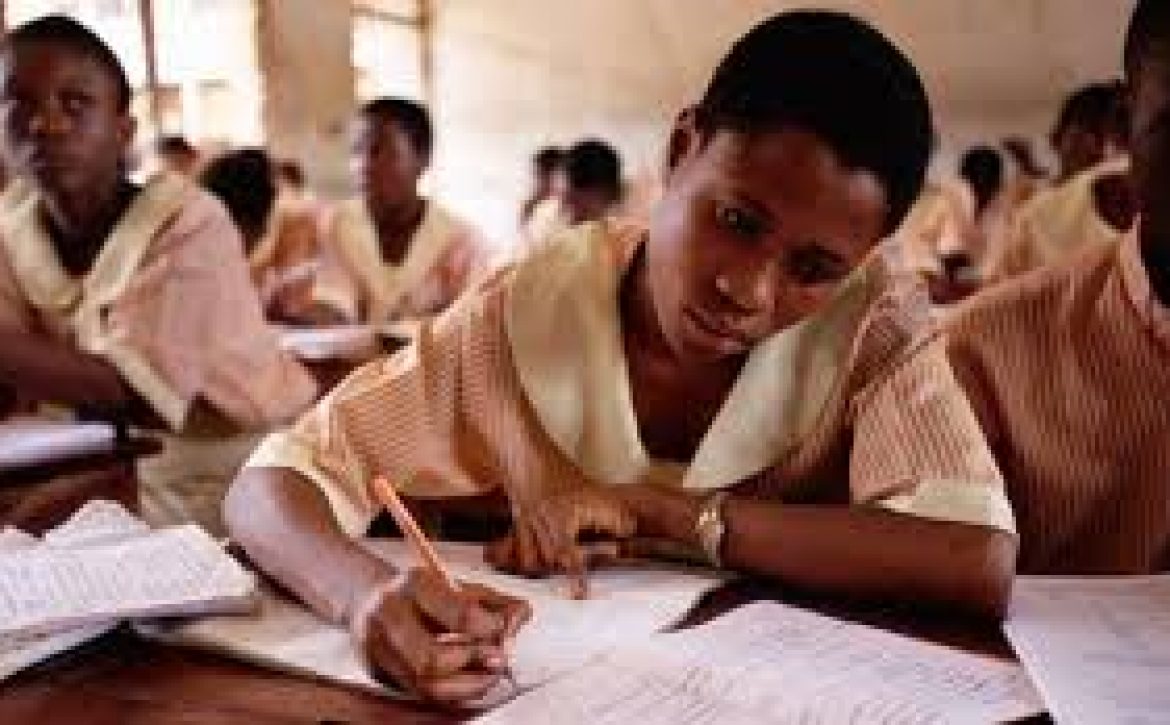Governor of Osun, Ogbeni Rauf Aregbesola, on Friday said the death of the elder statesman and chieftain of the pan-Yoruba socio-political organisation, Afenifere, Pa Olaniwun Ajayi.

In a statement by the Director, Bureau of Communication and Strategy, Office of the Governor, Mr. Semiu Okanlawon, Aregbesola said the late frontline politician believed and worked for the progress of the Yoruba race and the country as a whole.
The governor, who described the deceased politician as a giant and one of the surviving disciples of the Awolowo School of thought.
He said like the late Chief Obafemi Awolowo, the late Ajayi advocated for true federalism and resource control as panacea for the political imbalances in the country.
Aregbesola said the late politician was one of the best the country has produced as he never wavered in his political philosophy until his demise.
The statement read in part: “He was a politician of high repute and immense clout. His political horizon spread across the country and beyond. He was a giant in the battle for a better Nigeria.
“All his life, he defined his politics and pitted his tent early in life with the progressive school.
“Even after the demise of the late sage and when others abandoned the Awoist camp for other political philosophy, Pa Olaniwun Ajayi remained steadily on the Awo progressive track.
“He was, till he breathed his last, very consummate about the progress and development of Nigeria as well as that of the Yoruba race.
“To therefore describe him as a top-on-the-shelf politician and Awoist disciple of a first class hue is to aptly capture his essence as a politician.
“Nigeria as a whole and the Yoruba nation would surely miss his wealth of experience,”
Aregbesola also prayed for the repose of the late politician in the bosom of his Lord.
The appointment of Mr. Wale Idowu as the new Acting Director-General, Osun State Broadcasting Corporation (OSBC) has been described as a smooth transition, sustainability to quality and service delivery to the Corporation as well as a reward for dedication to one’s duty in the public service.
This was contained in a congratulatory message signed by the Coordinating Director, Ministry of Information, Home Affairs, Tourism and Culture, Mrs Femi Webster-Esho.
The congratulatory message described, the new Acting Director-General as a round peg in a round hole, a team player with relevant managerial skills needed to enhance revenue drive, harness corporation’s uplift in the media industry and ensure positive change.
While congratulating him on this well deserved appointment, the Coordinating Director also charged him to see the appointment as a spur to put in his best in meeting the yearnings and aspirations of the citizenry of the state, especially as it relates to the dissemination of information.
It would be recalled that until the new appointment, Mr. Wale Idowu was the Director, Marketing, Osun State Broadcasting Corporation (OSBC). His appointment takes effect immediately after the retirement of the former Director General, Mr. Sanjo Owoaje.

The Chairman, Visitation Panel, Ladoke Akintola University of Technology (LAUTECH), Ogbomoso, Chief Wole Olanipekun (SAN), has assured the owner states of the resolution of the crisis affecting the institution.
He gave the assurance in Ogbomoso at the inauguration of the Visitation Panel held at the university’s senate building.

LAUTECH, which is jointly owned by Oyo and Osun, has been enmeshed in ownership disagreement and funding.
The situation led to an industrial action by workers since June.
Olanipekun, the pro-chancellor at Ajayi Crowther University, Oyo, said the panel would resolve the ownership disagreements and funding.
He said the panel would also ensure that the school’s highly rated academic standard was revived.
“Academic activities in the university have been paralysed due to lack of funding and disagreement between the owner-states.
Our panel was inaugurated to look into how the ownership of the institution and funding can be consolidated. We are to revive the university as a beacon of light.
“The people should expect sumptuous academic excellence, output and input from us. I believe in the capabilities of members of the panel,” he said.
Contrary to speculations in town and on the social media platforms that the May/June West African Senior School Certificate Examination (WASSCE) in the state of Osun is on the downward trend, the State Government has said that the performance of its students is actually on the rise, relying on fresh information emanating from the West Africa Examination Council (WAEC).
A statement by the Director of Bureau of Communications and Strategy, Office of the Governor, State of Osun, Semiu Okanlawon, disclosed that an analysis of 10 years WASSCE results shows the massive investments in education by the administration of Ogbeni Rauf Aregbesola is showing increasing dividends.

Results seen in the analysis shows Osun students who passed with 5+ credits, including English and Mathematics, reached a record low of 6.86% of the total number of candidates who sat for the exams in 2007, long before the advent of Ogbeni Rauf Aregbesola in the state.
Okanlawon said that “Most critics fail to analyse Osun’s historical performance when comparing the performance of students across states in Nigeria.”He said that, “The laid-back analysis of comparing state by state performance by many is faulty, in that, if a state presents only 10,000 candidates for the WASSCE, and 7,500 students are able to secure 5 credits including mathematics and English, then such state with a pass rate of 75%, would be placed above a state that presents 100,000 candidates with a 50% pass rate.”
According to him, as much as this analysis could be theoretically correct, it fails to put into consideration, peculiarities of individual states. He said consider the State of Osun for example, analysis of WASSCE result over a 10-year period shows considerable improvement in the performance of students, reaching a climax of 46.3% in 2016.
“While this achievement may appear insignificant at face value, however, compared to the year 2007 when a woeful 6.86% pass rate was recorded, it attests to the considerable interventions the state government has made to tackle education head on. Since the Ogbeni administration took over governance in November 2010, students’ WAEC performance has gradually improved.
“Specifically, the 2016 WASSCE result (46.3 per cent pass rate) shows an improvement of 113.56 per cent over a space of one year when compared to the 2015 result (21.68 per cent pass rate). We can go on and on calculating how year in, year out, the Aregbesola administration has embarked on painstaking steps to not only address the relative decline and stagnation in students’ educational performance but recorded considerable improvement accordingly.
He noted that while skeptics and cynics sat back and dismissed the Ogbeni’s administration as it committed considerable steps to arrest the over 30 year rot in education, they failed to realise that, the future of youth is non-negotiable, as such considerable positive change of this magnitude requires systematic effort, determinism and perseverance which is often a slow and gradual process.
“Need I recall that the Ogbeni Rauf Aregbesola inherited a comatose education sector, where teachers lacked motivation, students were less interested in learning, and school buildings resembled chicken pens, rather than, institutions of learning. However, a quick run across the state shows considerable improvement from the past administrations in an effort to avoid failing too many of our children by sending them out into what we hope to become a 21st century economy through the doors of 20th century schools.
“New palatial learning buildings now dot the Osun landscape – One was recently commissioned by President Muhammudu Buhari on Thursday, 1st of September, 2016. Osun teachers are well paid and equipped – 5,000 of them have been trained and retrained so far, and students more than ever before, are taking vast opportunities before them.
“The Opon-Imo tablet still works wonders amongst students who possess them. Opon-Imo, an indigenous Technology Enhanced Learning Platform (TELP) with locally produced content is designed for the Nigerian secondary education system. It is preloaded with lesson notes on seventeen (17) subjects offered by students writing the West African Senior School Certificate Examinations (WASSCE) and NECO SSCE. Also preloaded inside the Opon-Imo tablet is over 40,000 past examination questions spanning a period of ten years, for (private) practice, 63 e-textbooks covering 17 subject areas that students do register for in external examinations and 51 audio tutorials installed as study aid.
“Opon-Imo is also preloaded with seven extra-curricular subjects such as Sexuality Education, Civic Education, Yoruba History, Ifa Traditional Religion, Computer Education and Entrepreneurship Education, and Twelve Thousand Yoruba Proverbs.
He maintained that the future of the kids, development of the economy and building of a nation through education is a promise the Ogbeni administration seeks to guard jealously and deliver.
“Osun may not be in the desired place amongst comity of states in WASSCE performance, but we are making considerable strides as we deliver our promise to the people, and Ogbeni’s investment in education is paying off,” Okanlawon said.

It’s an established fact that the willingness and ability to borrow do not automatically translate into economic growth. If you agree with this fact, how productive are the country’s recent borrowings? Governor Aregbesola has observed that our internal debts continue to represent more than two-thirds of Nigeria’s external debt profile, when the cost of servicing domestic debts is ridiculously far more expensive than servicing external debts. Governor Aregbesola has questioned government continuous borrowing internally when in so doing results in insufficient funds, skyrockets the cost of borrowing and above all, crowds out the real sector from the money market? Shouldn’t the high cost of domestic borrowing override whatever are the assumed benefits? Since both London Interbank Offer Rates (LIBOR) and the US Treasury Bonds rates offer far better interest rates for sovereign borrowings, why have we continued not to take advantage of cheaper interest rates?
Osun State raised a sukuk bond worth N10 billion (some $62 million) from the capital market to fund educational development – the first of such by Africa’s biggest economy. Governor Aregbesola is aware that Islamic financial instruments such as sukuk which attract zero percent interest have been used to finance infrastructure projects in countries like Malaysia and Indonesia, and in the Middle East, and could attract investors from such countries. The governor knows that Islamic finance requires a clear link with real economic activity and transactions have to relate to a tangible, identifiable asset, which comes in handy in the case of infrastructure financing. Governor Aregbesola strategy in managing Osun Debt ordered the issuing a sovereign sukuk will send a much needed positive message to the market amidst the negative investor sentiment that persists currently. He expressed confidence that Nigeria’s maiden sovereign sukuk which will be oversubscribed as both domestic and foreign investors have appetite for exposure to Nigeria. He therefore urged the DMO to take advantage of this unique opportunity to make a mark on the sukuk market in spite of the challenging times.
Governor Aregbesola has studied Osun low multilateral debt which is the total amount of money that Osun State owes to international financial institutions, such as the World Bank and the International Monetary Fund (IMF). Governor Aregbesola only took sukuk bond to build 11 High Schools and no other loan . For details of Osun State Sukuk projects go to www.osunsukukprojects.com to see eleven wonders of Governor Rauf Aregbesola. These financial entities insist that the repayment of multilateral debt become a priority and hold precedence over any other outstanding loans.
The federal government has unveiled a new debt management strategy partly in line with sukuk 2013 as introduced by Governor Aregbesola to run from 2016 – 2019 aimed at a marginal increase in external borrowing and increased commitment to capital projects execution. The DMO boss explained that the focus of the new initiative is to develop a debt management strategy that would ensure that in the face of macroeconomic and other financial constraints, the cost and risk profile of the public debt portfolio remains within acceptable limit over time.
“And therefore taking into account that external financing sources are on the average cheaper than domestic sources, it becomes more necessary to slant more of the borrowing in favour of external sources. “Therefore one of the major elements of this strategy is that over the medium, term we will strive to remix the public debt portfolio from 84 per cent domestic and 16 per cent external to 60 per cent domestic and 40 per cent external.
The Director General, Debt Management Office, DMO, Dr. Abraham Nwankwo, had different fora disclosed that the debt profile of Osun State is ‘sustainable’. But according to the director-general of the DMO who had commended the governor for being a trailblazer in this regard. The DMO director-general promised to encourage sukuk issuance in Nigeria which was introduced to Nigeria by Governor Rauf Aregbesola. Osun debt profile was a sustainable one and was healthy for the economic growth of the state. The DMO boss averred that the state needed to be encouraged in terms of management of debt, adding that Osun has not borrowed beyond its capacity.
The vision of the Governor of the State of Osun,Ogbeni Rauf Adesoji Aregbesola to open the state to investors through his lofty projects and programmes such as good road network and tight security of the state have continued to yield positive result with the establishment of a modern fish industry called “Aquarpro Agro Nigeria Limited” situated at Eko-ende town in Ifelodun Local Government area of the State.
The enthusiastic people of the ancient town of Eko-ende were overwhelmed with joy to receive government officials and management team of the new industry who paid them a familiarisation visit before the company could commence its operations.
Speaking during the visit,the Coordinating Director for the State of Osun Ministry of Agriculture,Food Security and Youth Engagement,Dr Oluwabukola Aluko congratulated the Kabiyesi,Elende of Eke- Ende,Oba Abdul Rauf Olaniyan Ajiboye and all sons and daughters of Eko -ende for being lucky among other towns in the State to host a multi million Naira industry in their community noting the economic,social and employment benefits of it to the town and the State.
Dr Aluko pointed out that the major factor that attracted the industry to Eko-ende town is Eko-ende Dam which was considered suitable for rearing Tilapia fish.
The Coordinating Director therefore sought the cooperation and support of the entire people of Eko-ende community to accommodate the company ,adding that in the nearest future the company will show case the town to the world with inflow of people that will patronise the industry.
In his own remark,the Principal Project Manager,Aquarpro Agro Industry,Mr Sayo Fadipe,disclosed that the aim of establishing the industry is to support the government at all levels and boost the economy through food production in order to stop patronising imported food that can be produced locally.
Mr Fadipe stressed that the industry has the capacity to produce Seven hundred and seventy two thousand ( 772,000)metric tone of Tilapia Fish before the middle of year 2017 which will be harvested,processed and packaged in the industry.
He assured the people of Eko-ende not to entertain any fear on benefit that will come to their community because the Memorandum Of Understanding (MOU) signed between the company and the Osun government has already taken care of their interest .
Mr Fadipe also requested for the cooperation and love of the people of Eko-Ende as the major factor that can make the industry succeed,noting that development strives where there is peace.
In his royal message,Elende of Eko-Ende ,Oba Abdul Rauf Olaniyan Ajiboye commended the State Governor, Ogbeni Rauf Aregbesola for being the pillar supporting the development coming to the town.
Oba Ajiboye ,who prayed for the success and growth of the new industry ,also assured the Government and the management of the industry that his people in Eko-Ende are peace loving who cherish development. He therefore promised that all the company properties would be adequately secured .
The Osun State Police Command on Friday said that it would no longer condone the recklessness of skaters on the highways.
The Police said that their act of holding on the moving cars, buses and motorcycles for fun has become a menace on the roads.
The Police Public Relations Officers, Folasade Odoro, said in a statement that this act by skaters is capable of causing distractions to drivers and ultimately leading to accidents that may claim lives.
Also, in order to forestall any breach of security, the Police said that they have mapped out stringent security measures to nip in the bud, all forms of crime and criminality in the state.
The Police warned that the law forbidding the plying of unregistered or unlicensed vehicles on the highways is still very much in force.
They warned owners of such vehicles to register them and stop covering their number plates or making it illegible for easy identification.
The Osun Police Command said that this warning became imperative owing to the increase in the number of fatal hit and run motor accidents, which is believed to be mostly perpetrated by unregistered drivers.
From a global perspective, the girl child is considered vulnerable to several societal ills. This perception is more pronounced in developing countries, where the belief is that there is the need for effective policies to safeguard the girl child from violence, limited access to education, neglect, abuse, gender disparities and other negative trends.
There is a growing concern around the world that urgent actions need to be taken to address these challenges and education and empowerment initiatives have been identified as the needed tools.
In celebrating this year’s International Day of the Girl Child on October 11, the attention of stakeholders from around the world was focused on issues surrounding the girl child. The theme of this year’s celebration was “Girls’ Progress = Goals’ Progress: A Global Girl Data Movement”. This special day was set aside to raise public awareness on girls’ right and highlight gender inequalities that are widespread worldwide.
The latest UN statistics show that there are 1.1 billion girls in the world today. These girls represent an opportunity to shape a sustainable world that’s better for everyone. However, their dreams and potentials are often thwarted by lack of opportunities and discrimination.
Like other developing countries, the girl child in Nigeria is not immune to these challenges. A peculiar case is that of the 276 girls kidnapped in a school in Chibok, Borno state. The negative experiences of these girls have become a rallying point for the challenges faced by the girl child worldwide.
The day also helped reveal the efforts made by governments at various levels to educate and empower the girl child. Worthy of note are those undertaken by Osun state.
Before Ogbeni Rauf Aregbesola assumed office on November 27, 2010, the public education system was in a bad state such that only students whose parent couldn’t afford private schools were left in public schools.
Facilities of these public schools were not only dilapidated, students’ performance in both internal and external exams were at an all-time low with tuition fees in the state owned tertiary institution outrageous.
The situation has however taken a positive turn since the advent of his administration. The government has also placed priority on girl child education. Presently in the state, there are 622,726 students between the elementary, middle and high school. Of these number, 309,488 are females and 313,238 are males. This is a laudable achievement that dwarfs the average expectation for developing nations.
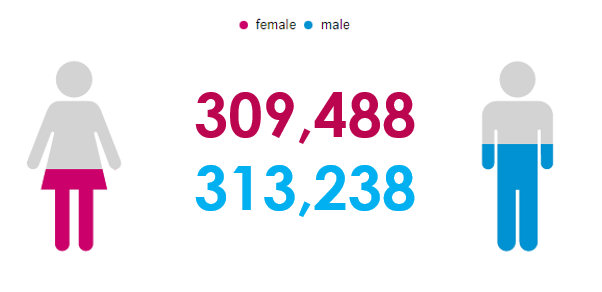
Infographic showing the distribution of male and female students In Osun State.
The governor restructured the education system into elementary, middle and high school structure. He also constructed 100 Elementary, 50 Middle, and 20 High Schools during his first term through the O’School programme.
He also focused on improving the nutrition of students in public schools by introducing the school feeding programme, O’Meals in line with the UN recommendation. The government believes a well-fed pupil will be more attentive in class compared to a hungry pupil.
It’s no surprise that the programme has recorded success stories with the school enrollment increasing by 25% spread over 38,000 pupils within four weeks of its introduction.
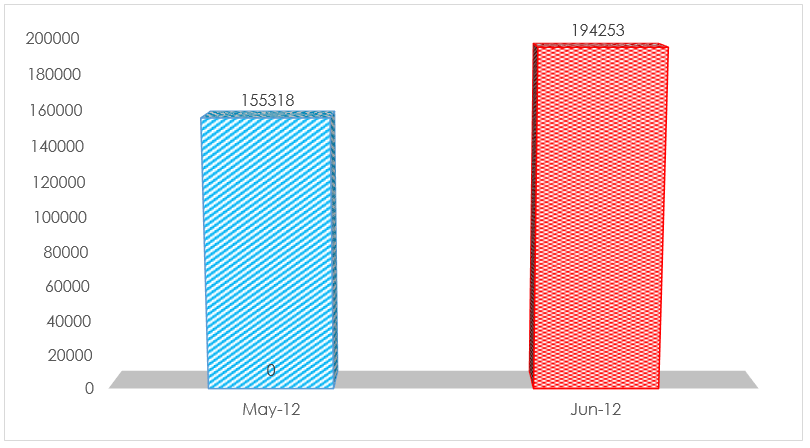
Graph showing the increase in school enrollment from May to June, 2012
Apart from education, O’Meals programme has also helped economically, improving the production capacities of farmers and empowering 3,007 women appointed as food vendors to serve pupils on school days. It is noteworthy that the Aregbesola-led administration spends N3billion naira per annum to feed primary 1 – 4 pupils in all the public primary schools in the State of Osun.
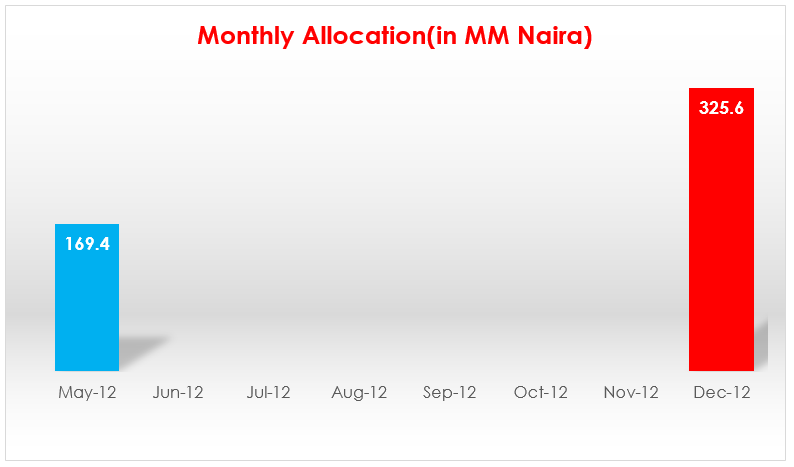
Graph showing the monthly increase in allocation for the O’Meals Programme in Osun State
Of the 13 states that started the feeding programme, only the State of Osun is still implementing the School Feeding Programme.
Osun State recorded an outstanding feat in its quest to promote education by sponsoring 5 outstanding female students in an exchange program in the United States. The program is in partnership with an NGO AWOW International Girls Leadership Initiative, which empowers and offers skills and professional mentorship to young women.
The 5 girls will attend the annual AWOW Summit & College Tour Leadership Forum for young women, scheduled to hold at the Southern Methodist University, Dallas, Texas, United State, with the theme ” Leading the Future.”
Not only will the summit enable the girls to share experiences and knowledge through the cultural exchange, the girls would also have opportunity of scholarship for University Education in the USA.
Statistics show that when 10% more girls go to school, a country’s GDP increases by 3% on the average and a child born to a literate mother is 50% more likely to survive past the age of five.
Governor Aregbesola while speaking on government’s commitment to education development, said: “This is the continuation of our commitment to standard education. To us, education remains our priority and as a matter of fact, this government has invested hugely on this.”
He also stressed the importance of bridging the gap between public and private schools as a means of preparing the nation for good leadership in the future.
The UN explained that girls’ education is both an intrinsic right and critical in reaching other development objectives. Educating girls can help break the cycle of poverty.
Girls’ education is essential in achieving quality learning relevant to the 21st century, including girls’ transition to and performance in secondary school and beyond. Adolescent girls that attend school delay marriage and childbearing, are less vulnerable to disease including HIV and AIDS, and acquire information and skills that lead to increased earning power. Evidence shows that the return to a year of secondary education for girls correlates to a 25 per cent increase in wages later in life, the UN said.
Contrary to speculations in town and on the social media platforms that the May/June West African Senior School Certificate Examination (WASSCE) in the state of Osun is on the downward trend, the State Government has said that the performance of its students is actually on the rise, relying on fresh information emanating from the West Africa Examination Council (WAEC).

A statement by the Director of Bureau of Communications and Strategy, Office of the Governor, State of Osun, Semiu Okanlawon, disclosed that an analysis of 10 years WASSCE results shows the massive investments in education by the administration of Ogbeni Rauf Aregbesola is showing increasing dividends.
Results seen in the analysis shows Osun students who passed with 5+ credits, including English and Mathematics, reached a record low of 6.86% of the total number of candidates who sat for the exams in 2007, long before the advent of Ogbeni Rauf Aregbesola in the state.
Okanlawon said that “Most critics fail to analyse Osun’s historical performance when comparing the performance of students across states in Nigeria.”He said that, “The laid-back analysis of comparing state by state performance by many is faulty, in that, if a state presents only 10,000 candidates for the WASSCE, and 7,500 students are able to secure 5 credits including mathematics and English, then such state with a pass rate of 75%, would be placed above a state that presents 100,000 candidates with a 50% pass rate.”
According to him, as much as this analysis could be theoretically correct, it fails to put into consideration, peculiarities of individual states. He said consider the State of Osun for example, analysis of WASSCE result over a 10-year period shows considerable improvement in the performance of students, reaching a climax of 46.3% in 2016.
“While this achievement may appear insignificant at face value, however, compared to the year 2007 when a woeful 6.86% pass rate was recorded, it attests to the considerable interventions the state government has made to tackle education head on. Since the Ogbeni administration took over governance in November 2010, students’ WAEC performance has gradually improved.
“Specifically, the 2016 WASSCE result (46.3 per cent pass rate) shows an improvement of 113.56 per cent over a space of one year when compared to the 2015 result (21.68 per cent pass rate). We can go on and on calculating how year in, year out, the Aregbesola administration has embarked on painstaking steps to not only address the relative decline and stagnation in students’ educational performance but recorded considerable improvement accordingly.
He noted that while skeptics and cynics sat back and dismissed the Ogbeni’s administration as it committed considerable steps to arrest the over 30 year rot in education, they failed to realise that, the future of youth is non-negotiable, as such considerable positive change of this magnitude requires systematic effort, determinism and perseverance which is often a slow and gradual process.
“Need I recall that the Ogbeni Rauf Aregbesola inherited a comatose education sector, where teachers lacked motivation, students were less interested in learning, and school buildings resembled chicken pens, rather than, institutions of learning. However, a quick run across the state shows considerable improvement from the past administrations in an effort to avoid failing too many of our children by sending them out into what we hope to become a 21st century economy through the doors of 20th century schools.
“New palatial learning buildings now dot the Osun landscape – One was recently commissioned by President Muhammudu Buhari on Thursday, 1st of September, 2016. Osun teachers are well paid and equipped – 5,000 of them have been trained and retrained so far, and students more than ever before, are taking vast opportunities before them.
“The Opon-Imo tablet still works wonders amongst students who possess them. Opon-Imo, an indigenous Technology Enhanced Learning Platform (TELP) with locally produced content is designed for the Nigerian secondary education system. It is preloaded with lesson notes on seventeen (17) subjects offered by students writing the West African Senior School Certificate Examinations (WASSCE) and NECO SSCE. Also preloaded inside the Opon-Imo tablet is over 40,000 past examination questions spanning a period of ten years, for (private) practice, 63 e-textbooks covering 17 subject areas that students do register for in external examinations and 51 audio tutorials installed as study aid.
“Opon-Imo is also preloaded with seven extra-curricular subjects such as Sexuality Education, Civic Education, Yoruba History, Ifa Traditional Religion, Computer Education and Entrepreneurship Education, and Twelve Thousand Yoruba Proverbs.
He maintained that the future of the kids, development of the economy and building of a nation through education is a promise the Ogbeni administration seeks to guard jealously and deliver.
“Osun may not be in the desired place amongst comity of states in WASSCE performance, but we are making considerable strides as we deliver our promise to the people, and Ogbeni’s investment in education is paying off,” Okanlawon said.


